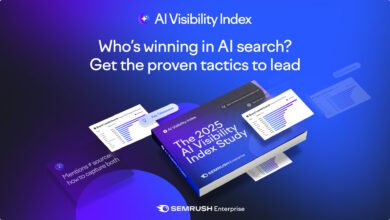Topic: ai optimization
-

AI Email Subject Lines That Boost Revenue & Conversions
AI email subject line optimization uses data analysis and continuous testing to predict engagement and drive opens, clicks, and conversions, moving beyond simple idea generation. Effective implementation requires clean, organized contact data and structured prompts to ensure personalized, brand-a...
Read More » -

5 Digital Marketing Tactics That Deliver Results in 2024
Businesses must adopt forward-thinking marketing approaches in 2024 to stay competitive and connect with modern consumers, translating strategic goals into measurable growth and enhanced online visibility. Optimizing content for AI platforms like ChatGPT and Google's AI Overviews is critical, req...
Read More » -

Hostinger Empowers WordPress with Agentic Web Capabilities
Hostinger has launched Web2Agent, a one-click feature that optimizes WordPress sites for AI agents, ensuring compatibility with tools like Claude and Cursor while maintaining existing robot exclusion standards. The Agentic Web represents a shift in internet functionality, focusing on seamless AI ...
Read More » -

How Search Engines Fuel AI Like ChatGPT and Gemini
AI systems like ChatGPT and Google Gemini rely heavily on existing high-ranking web content, making established SEO practices foundational for visibility. These AI models prioritize credible sources using metrics like E-E-A-T, reinforcing the need for authoritative, trustworthy, and comprehensive...
Read More » -

AI's Grid Revolution: Boon or Bane for Our Energy Future?
AI can optimize electricity distribution in real-time, reducing carbon emissions and improving energy efficiency by analyzing complex data faster than humans. Human oversight remains essential for grid operations, as critical infrastructure requires reliability and security before full automation...
Read More » -

AI Visibility Index: Who's Leading in AI Search?
AI search engines like ChatGPT and Google AI Mode are transforming digital marketing, prompting the creation of the AI Visibility Index to analyze brand performance across these platforms. Mentions in AI responses are now more influential than traditional search rankings, with visibility favoring...
Read More » -

AIXA Miner Debuts Eco‑Friendly AI Cloud Mining Platform for Seamless Crypto Earnings
AIXA Miner unveils a zero-hardware, AI-optimized cloud mining service powered by renewable energy and FinCEN compliance. With just $100 you can start earning daily crypto payouts, no tech know-how required. It may signal a pivotal evolution toward greener, more transparent crypto mining.
Read More » -

AI Visibility: The Hidden Execution Challenge
AI-powered discovery systems are transforming digital marketing, making traditional SEO strategies potentially obsolete if not adapted to new AI requirements. Brands risk losing visibility if they fail to optimize for AI search, which prioritizes structured knowledge, comprehensive content, and v...
Read More » -

AI's Search Overhaul: 90% of Businesses Fear SEO Decline
Artificial intelligence is fundamentally changing digital search, causing nearly 90% of companies to worry about maintaining their organic visibility as AI tools become primary information sources. Businesses are responding by investing in AI optimization, with 85.7% planning or already investing...
Read More » -

Unlock Google Ads PMax: Audience Signals & Search Themes Explained
Performance Max campaigns are goal-based systems where Google's AI autonomously targets users likely to convert, rather than allowing manual audience or keyword selection. Audience signals and search themes serve as optional hints to guide the AI but are not strict targeting rules, as the system ...
Read More » -

AI Hype vs. SEO Reality: What Actually Drives Revenue
Despite the buzz around AI, traditional Google organic search remains the primary revenue driver for businesses, with AI-driven traffic accounting for less than one percent of total website visits. Strategic investment should prioritize proven SEO tactics like technical improvements and quality c...
Read More » -

Quiet Martech: The New Way Teams Are Working
The quiet martech movement emphasizes seamless integration and user experience in marketing technology, prioritizing tools that empower teams rather than overwhelm them with complexity. Many organizations have accumulated excessive tech stacks that hinder productivity, leading to wasted time on m...
Read More » -

5 Hidden Forces Sabotaging Your Enterprise SEO
Enterprise SEO success is often hindered by organizational barriers like departmental silos and misaligned incentives, rather than a lack of technical expertise or skilled teams. Structural issues such as fragmented ownership and conflicting departmental goals prevent cohesive SEO strategies and ...
Read More » -

Tap Electric: Solving the EV Charging Chaos in the Netherlands
Electric vehicle owners face challenges with public charging, including fragmented networks, unpredictable pricing, and compatibility issues, which cause inconvenience and anxiety. Tap Electric, a startup, offers an integrated platform providing real-time pricing comparisons, session management, ...
Read More » -

HubSpot's Top 16 Updates of August 2025 Revealed
HubSpot's August 2025 release introduces major AI integration, personalization tools, and data management features to improve workflows across marketing, sales, and service teams. Key new tools include a Personalization app for anonymous visitor targeting, an AEO Strategy tool for AI search visib...
Read More » -

Google's Offerwall Aims to Offset AI's Impact on Publisher Revenue
Google's new Offerwall feature helps publishers diversify revenue streams by offering alternative content access methods like micropayments, surveys, and video ads, with AI-driven optimization for display timing. Early adopters, such as Sakal Media Group, report significant benefits...
Read More » -

Meta and Stanford's Ultra-Thin Holographic System Could Disrupt Big Tech
Meta and Stanford researchers have developed an ultra-thin holographic display system measuring just three millimeters, potentially enabling lightweight mixed reality glasses. The system uses holography with lasers, MEMS mirrors, and an AI-optimized spatial light modulator to create images with a...
Read More » -

Google Open-Sources AI Ads API for Developers
Google has launched an open-source MCP Server on GitHub, enabling developers to integrate AI into digital marketing operations and allowing for intelligent data interaction with Google Ads. The server uses the Model Context Protocol to simplify communication between AI systems and advertising pla...
Read More »

















